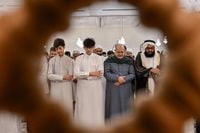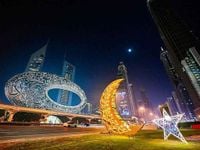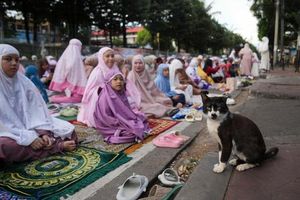The UAE will celebrate Eid Al Fitr on Sunday, March 30, 2025, marking the end of Ramadan, which lasted 29 days this year.
After a month filled with fasting, reflection, and spiritual devotion, the United Arab Emirates is set to celebrate Eid Al Fitr on Sunday, March 30, 2025. This festival marks the official end of Ramadan, a holy month observed by Muslims worldwide. The date of Eid Al Fitr is determined by the Islamic Hijri calendar, which is based on the lunar cycle. This year, the crescent of Shawwal, the month following Ramadan, was sighted on the evening of Saturday, March 29.
The Moon-Sighting Committee, established by the UAE Council for Fatwa, convened at the historic Qasr Al Hosn in Abu Dhabi to confirm the sighting. Following this confirmation, the Presidential Court issued an official statement declaring Sunday as the first day of Eid Al Fitr 1446 AH.
In a festive spirit, the UAE government has announced that both public and private sector workers will enjoy three days off for Eid: Sunday, March 30; Monday, March 31; and Tuesday, April 1. Work will resume on Wednesday, April 2, marking the first major public holiday of 2025 after New Year’s Day.
Eid Al Fitr, which translates to "Festival of Breaking the Fast," is one of the most significant occasions in the Islamic calendar. The day begins with Eid prayers, which are held shortly after sunrise at mosques and open prayer grounds across the Emirates. The official prayer timings for various cities are as follows: Abu Dhabi at 6:32 AM, Dubai at 6:28 AM, Sharjah at 6:28 AM, Ajman at 6:19 AM, Umm Al Quwain at 6:27 AM, Ras Al Khaimah at 6:25 AM, Fujairah at 6:25 AM, and Al Ain at 6:26 AM.
After the prayers, families gather to share festive meals, exchange greetings, and give Zakat Al Fitr, a form of charity offered to those in need, reinforcing the spirit of generosity that defines the holy month. The Presidential Court extended warm congratulations to President His Highness Sheikh Mohamed bin Zayed Al Nahyan, His Highness Sheikh Mohammed bin Rashid Al Maktoum, and the Rulers of the Emirates, as well as to the people of the UAE and Muslims around the world.
To ensure a smooth and enjoyable holiday experience for residents and visitors, municipalities across the UAE have announced free public parking during the Eid Al Fitr break in several emirates. In Dubai, the Roads and Transport Authority (RTA) confirmed that all public parking will be free from Shawwal 1 to 3, with the exception of multi-level parking facilities. Regular paid parking will resume on 4 Shawwal (Wednesday, April 2).
Meanwhile, Parkin Company will begin implementing its new flexible tariff system for public parking in Dubai starting April 4, introducing peak and off-peak rates across standard and premium parking zones. Peak hours will be charged from 8–10 AM and 4–8 PM, excluding Sundays and public holidays. In Sharjah, the municipality confirmed that public parking will be free on the first, second, and third days of Eid, except in zones with blue signage, which remain under paid parking regulations even on holidays. Ajman will also offer free parking from 1 to 3 Shawwal, with regular paid parking services resuming on 4 Shawwal.
While the private sector may operate with adjusted hours during the holiday, most government offices, schools, and public institutions will remain closed throughout the official break. Malls, restaurants, parks, and other public spaces are expected to be bustling, as families take advantage of the time off to travel, gather with loved ones, or enjoy festive events across the country.
As the holy month of Ramadan draws to a close, the UAE has officially announced that Eid ul-Fitr 2025 will fall on Sunday, March 30. The much-anticipated declaration came after the country's moonsighting committee convened on the evening of Saturday, March 29, confirming the sighting of the Shawwal crescent—marking the end of Ramadan fasting and the beginning of Eid-ul-Fitr celebrations.
In a notable blend of tradition and modern technology, the UAE has taken innovative steps in its moonsighting process. The country deployed AI-powered drones from the Al-Khatim Astronomical Observatory to assist in locating the new moon. This initiative enhances visibility and accuracy, reducing the ambiguity that often surrounds moon sightings. The integration of artificial intelligence in the process reflects the UAE’s commitment to staying at the forefront of scientific advancements while respecting Islamic traditions.
The Eid ul-Fitr break will extend from Sunday, March 30 to Tuesday, April 1, allowing families and friends ample time to gather, celebrate, and indulge in festive traditions. Eid in the UAE is a grand affair, with city-wide festivities, dazzling fireworks, and an abundance of communal prayers. Families come together for feasts featuring traditional Emirati dishes, while shopping malls and souks buzz with last-minute preparations.
The spirit of giving is also at its peak, as people exchange gifts and donate to those in need, reinforcing the essence of Eid—gratitude, charity, and unity. As technology continues to evolve, the UAE’s AI-assisted moonsighting initiative might set a precedent for other countries looking to modernise their approach while staying rooted in religious customs. Whether through telescopes, drones, or the naked eye, the beauty of the Eid crescent remains a symbol of renewal, hope, and celebration for Muslims around the world.
With a long weekend ahead and cities alive with festivities, Eid ul-Fitr 2025 in the UAE promises to be a blend of cherished traditions and futuristic innovations—a perfect reflection of the country’s vision for the future.





